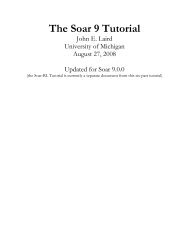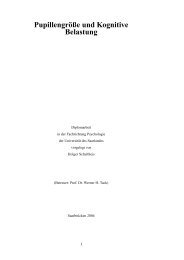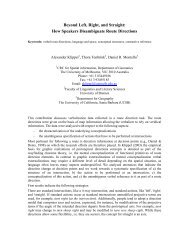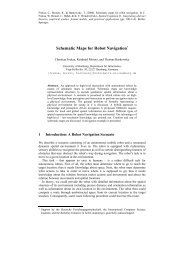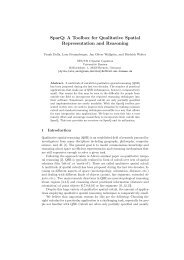Fuzzy Logic: An Interface Between Logic and Human Reasoning
Fuzzy Logic: An Interface Between Logic and Human Reasoning
Fuzzy Logic: An Interface Between Logic and Human Reasoning
You also want an ePaper? Increase the reach of your titles
YUMPU automatically turns print PDFs into web optimized ePapers that Google loves.
instead, less constraining ordering relations like partial orderings may be<br />
appropriate.<br />
Considering the fact that it took 25 years to put fuzzy logic into wide use in<br />
the well-understood engineering domain of control, we should not be<br />
surprised if some barriers must be removed before fuzzy logic will be widely<br />
applied to more delicate areas of fuzzy reasoning.<br />
For judging the quality of a representation formalism, I have proposed taking<br />
a representation-theoretical viewpoint: The correspondence between the<br />
represented domain <strong>and</strong> the formalism is at least as important as the<br />
representation's formal properties taken by themselves. This viewpoint<br />
permits a high-level characterization of the overall representation problem. I<br />
have also argued that real-world knowledge <strong>and</strong> formal knowledge are<br />
formally incommensurable. As long as the laws of human reasoning are not<br />
well understood, a good model of human reasoning should be expected to<br />
preserve some paradoxes; experimentation with the model may deepen the<br />
underst<strong>and</strong>ing <strong>and</strong> help resolve them.<br />
Acknowledgments<br />
I acknowledge stimulating discussions on this topic at the Tasso workshop<br />
1993 in Bonn; at the panel discussion on <strong>Fuzzy</strong> <strong>Logic</strong> <strong>and</strong> AI at IJCAI '93 in<br />
Chambery, France; at the GI-Workshop "<strong>Fuzzy</strong>-Systeme '93" in<br />
Braunschweig, Germany; <strong>and</strong> valuable comments by Gerhard Dirlich.<br />
References<br />
0. C. Elkan, "The Paradoxical Success of <strong>Fuzzy</strong> <strong>Logic</strong>," IEEE Expert, to appear.<br />
1. S.E. Palmer, "Fundamental Aspects of Cognitive Representation,"<br />
Cognition <strong>and</strong> Categorization, Lawrence Erlbaum, Hillsdale, N.J., 1978. pp.<br />
259-303.<br />
Christian Freksa is a professor in the Computer Science Department <strong>and</strong> the<br />
Cognitive Science Graduate Program at the University of Hamburg, Germany.<br />
His research interests include qualitative spatial <strong>and</strong> temporal reasoning, <strong>and</strong><br />
representing incomplete, uncertain, <strong>and</strong> fuzzy knowledge about the physical<br />
world. He studied computer science <strong>and</strong> AI at the Technical University of<br />
Munich, the University of San Francisco, <strong>and</strong> the University of California,<br />
Berkeley, where he received his Ph.D. in 1981. His work has appeared in<br />
several journals <strong>and</strong> anthologies, including Approximate <strong>Reasoning</strong> in<br />
Decision <strong>An</strong>alysis, (North-Holl<strong>and</strong>, 1982), <strong>and</strong> Artificial Intelligence<br />
Methodology, Systems, Applications, (North-Holl<strong>and</strong>, 1985), <strong>and</strong> Artificial<br />
Intelligence Journal 1992. Christian Freksa can be reached at the Fachbereich<br />
Informatik, Universität Hamburg, Vogt-Kölln-Str. 30, 22527 Hamburg,<br />
Germany; fax 49-40-54715-385; Internet: freksa@informatik.uni-hamburg.de.<br />
– 4 –



